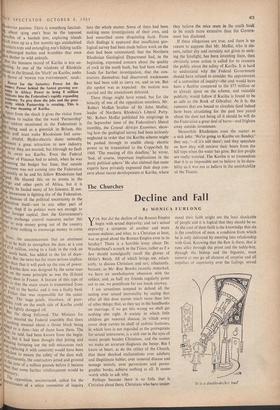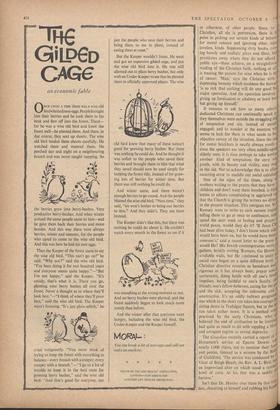The Churches
Decline and Fall
By MONICA FURLONG
YES, but did the decline of the Roman Empire begin with sexual depravity; and isn't sexual depravity a symptom of another and more serious malaise; and what, to a Christian at least, was so good about the Roman Empire even in its heyday? There is a horrible irony about Dr. Weatherhead's remark in the Times, rather as if a Jew should nostalgically recall the glories of Hitler's Reich. All of which brings me, reluct- antly, to discuss Christians and sex; reluctantly, because, as Mr. Roy Brooks recently remarked, we have an unwholesome obsession with the subject, and, as half my friends regularly point out to me, we pontificate far too much anyway.
I am sometimes tempted to defend all the tutting over sexual immorality by saying that after all this does matter much more than lots of other things; that, as they say in the handbooks on marriage, if we get this wrong we shall get nothing else right. A society in which little children get venereal disease, in which every sweet shop carries its shelf of sadistic fantasies, in which love is not regarded as the prerequisite for sexual intercourse, is a sick one in the eyes of many people besides Christians, and the sooner we make an accurate diagnosis the better. But I know at heart, as do the critics of the Church, that these shocked exclamations over adultery and illegitimate babies, over venereal disease and teenage morals, over perversions and porno- graphic books, achieve nothing at all. It seems worth while to ask why.
Perhaps because there is so little that is Christian about them. Christians who have under-
stood their faith aright are the least shockable of people' and it is logical that they should be so. At the root of their faith is the knowledge that sin is the condition of man, a condition from which he is only delivered by entering into relationship with God. Knowing that the flaw is there, that it runs alike through the priest and the teddy-boy, through the bishop and the bigamist, must remove at one go all element of surprise and all impulses of superiority over the failings. sexual '11 is a double-decker bust'
or otherwise, of other people. Since, to Christian, all sin is petversion, there is II point in picking out certain kinds of behavl for moral censure and ignoring other, cqu loveless, kinds. Suppressing dirty books, ens ing bawdy and realistic plays and films, hid prostitutes away where they do not offend public eye—these achieve, on a straightfoN reading of the Christian faith, nothing at all is treating the patient for acne when he is d of cancer. 'Man,' says the Christian with depressing honesty which maddens the huma 'is so sick that nothing will do any good bel major operation. And the operation involves giving up fornication or adultery or lewd bo but giving up himself.'
It remains to ask how so many other% dedicated Christians can continually speak a they themselves were outside the struggling 111 of temptation and sin, instead of paint engaged; and to wonder at the emotion w seems to lurk for them in what needs to be objective survey of the situation. Since the to for moral brickbats is nearly always youth since the speakers are very often, middle-age elderly men, it is time perhaps to take notie another kind of temptation; the envy '‘‘` youth, with its beauty and virility, may In in the old. Not to acknowledge this is to allrk recurring error to muddle our social calcula One of the signs of the times, along mothers writing to the papers that they have children and don't want them bombed, is inj letters to editors complaining in aggrieved t that the Church is giving the writers no direr in the present situation. This intrigues me. If Ramsey were to write to such earnest inqui telling them to go at once to confession, anA spend the next week in fasting and praYer. world peace, would they do it? 'If Jesus C had been alive today, I don't know which std would have been on, but he would have bee,r1 someone's,' said a recent letter to the press; would He? His Jewish contemporaries were, gathers, briskly writing 'Romans, Go Horne,1 available walls, but He continued to insist social cure began on a quite different level. Christian directive remains as humdrum an rigorous as it has always been; prayer and sacraments, doing battle with all one's lov impulses, being faithful to one's family, ° friends, one's fellow-believers, caring for the 11• and the sick, accepting the unlovable and unattractive. It's an oddly indirect progra13 one which in the short run takes less courage sitting down in Trafalgar Square, but in the run takes rather more. It is a method w practised by the early Christians, who believed the end of civilisation to be irorniof had quite as much to do with toppling a bl° and arrogant regime as sexual depravity. The Guardian recently carried a report of Horsemen's service at Epsom Downs W nearly 1,000 riders, not to mention their lin and ponies, listened to a sermon by the BiS of Guildford. 'The service was conducted by Vicar of Burgh Heath, the Rev. A. L. Bird, f an improvised altar on which stood a synth,i bowl of corn. At his feet was a saddle harness.'
Isn't that Dr. Huxley over there by that 10 box, chuckling to himself and rubbing his hail















































 Previous page
Previous page